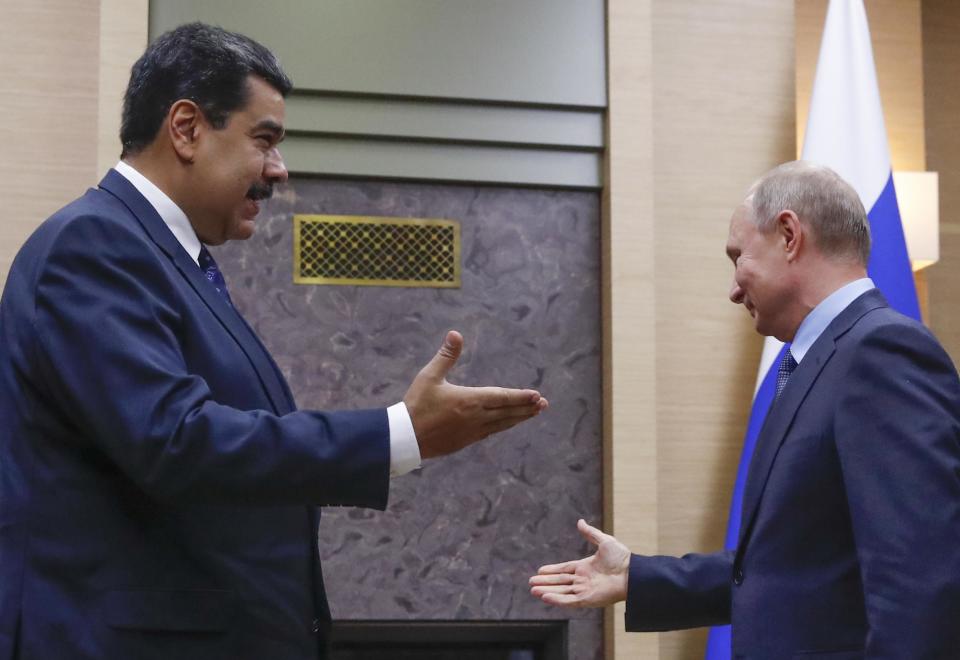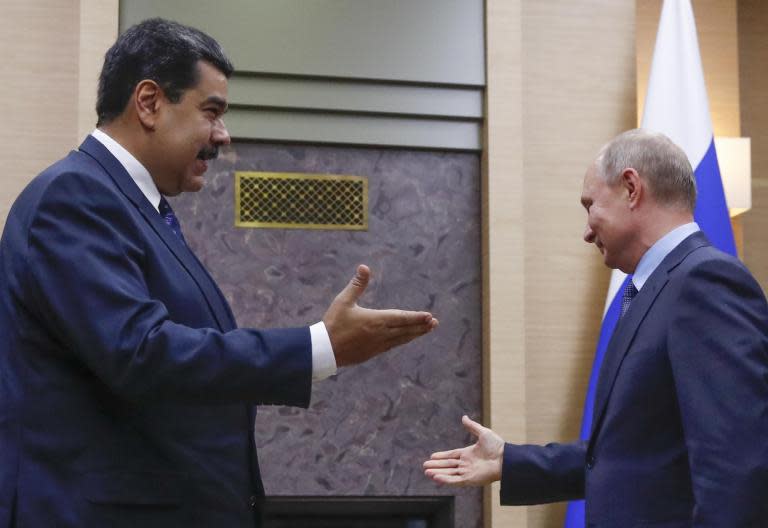Is Russian support for Venezuela's Maduro waning?
The symbolism of aid lorries, halted by barricades on the Venezuela-Colombia border, would have been familiar enough for anyone watching from the Kremlin. It told the story of an outmanoeuvred regime, a default defensive response, and terrible PR.
Russia, one of Venezuela’s major backers since Hugo Chavez took power in 1998, finds itself holding an increasingly toxic asset.
With every week, power seems to be slipping away from Nicolas Maduro, Chavez’s hand-picked successor, and towards his rival, the leader of the outlawed National Assembly, Juan Guaidó. An overwhelming majority of countries in the west and in Latin America now recognise his presidency.
Russia has shown few signs of following suit. At the same time, ever so slightly, its calculations do seem to be tilting away from Mr Maduro – and towards protecting the more tangible assets it has left in the country.
In interviews with experts and politicians, The Independent recorded a growing resignation that Maduro’s regime would not endure in the long term. Alongside this was a realisation that Moscow had few cards left to play. There was little expectation of a new cash injection into the crisis economy – and less so of staging a major military intervention in a country halfway around the globe.
While Russia is far from being the only major backer of Venezuela, it is arguably its most exposed creditor.
Chinese investment stands at nearly three times the estimated $20bn-25bn (£15bn-£19bn) Moscow is said to have ploughed into Venezuela. But Chinese investment has followed a more pragmatic pattern, and is largely repayable in oil. The Russian bet, which includes military deals and controversial, discounted stakes in oil fields, is more vulnerable to politics.
The opposition-controlled National Assembly has, for example, called for some of the most recent oil deals with Russia’s Rosneft to be revisited. The reported appearance of Russian mercenaries at oil installations seems to be a direct response to these threats.
Dmitry Rosenthal, a Latin American expert at the Russian Academy of Sciences, told The Independent he believed Moscow could reach compromise with whatever government is in power. Backchannels were already likely in play, he says. But “unease” about the opposition’s rhetoric remained.
“The Kremlin has been much more supportive of Maduro’s regime than the maximally pragmatic China, which has engaged with the opposition to a much greater extent,” he said. “Unsurprisingly, it sees Maduro as a much more reliable partner when it comes to protecting its interests.”
As with other matters of foreign policy, Vladimir Putin is said to be taking a leading role in formulating the Russian response to the crisis. There have been few clues as to the president’s thinking. But on Wednesday, Bloomberg claimed some insight by quoting two Kremlin sources, both expressing doubt about the viability of Maduro’s regime.
The report was quickly dismissed by Kremlin spokesperson Dmitry Peskov. Yet voices in the outer circle of Russia’s foreign policy community in parliament and the foreign ministry have toned down earlier, more categorical statements of support.
Vladimir Dzhabarov, deputy chair of the international affairs committee of Russia’s upper house, told The Independent that while Russia would not “walk back” its support of Maduro, it accepted its ally faced a battle to survive.
“Russia has never hidden its recognition of Maduro as the country’s only legitimate president,” he said. “We understand he has led a flawed government and didn’t get everything right in the economy or the social arena. But is it really worth taking country to revolution or collapse? We don’t think so.”
Mr Dzhabarov said Venezuela’s future could only be resolved around the negotiation table, but said the Guaidó opposition was “unwilling” to enter talks. “Half of Venezuela” still supported the Maduro regime, he said, and could be provoked to take to the streets if their man was toppled.
Fyodor Lukyanov, a foreign expert considered close to the policy elite, also suggested Russia held little hope for the survival of the Maduro regime. But it could continue, he said, for as long as it had the army on its side, which “might be much longer than people think”.
As toxic as things might get with Maduro, what Moscow would not do is convert its support to Guaidó, who was “an American puppet”.
“As terrible a president as Maduro is, he’s loyal and he’s a partner,” said Lukyanov. “For Russia that is important.”


